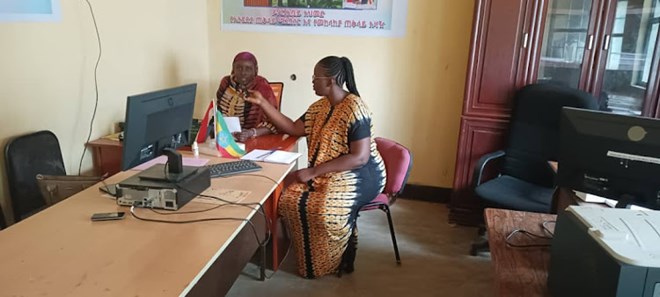
by ABDIKADIR CHARI
Tuesday July 18, 2023

Women leaders Adhi Boru in an office where they run their cross-border peace meetings. Image: ABDIKADIR CHARI
The Kenya-Ethiopia border has a long history of ethnic conflict and violence.
The region has equally experienced a spike in both political and social tensions that have threatened the wider peace and stability in the borderlines.
These conflicts were propagated by cultural beliefs that locked significant stakeholders out of key processes that could lead to the creation of cohesion.
In the past, women were considered like children and they were not involved in any peace meetings.
But their recent involvement has brought peace and stability to the borderlines.
For the past year, CIFA's Women for Peace project has worked to mitigate potential conflicts.
"We are pleased that the border communities came up with mutually agreeable local and traditional mechanisms where they can address and manage any issues that may arise to prevent conflict," CIFA Kenya program officer Halkano Abkula told the Star.
Halkano said they worked with like-minded partners and brought together local communities living in the border town to discuss how they can identify challenges that may trigger violence and find ways to overcome them.
"Together with relevant development partners, we collaborated in strengthening cross-border community dialogue, instituting early warning mechanisms for conflict prevention," he said.
Halkano said discrimination, gender-based violence and economic vulnerability have in the past divided societies and increased the risk of violence.
It is because of these realities, that he said his organization saw the need to support local conflict resolutions by ensuring everyone counts including women participating on equal terms.
They also established structures and processes like regular peace meetings and peace forums among the communities.
During these meetings, they worked closely with women and youth in promoting cross-border peace initiatives.
"Peace cannot be found in big hotels in town. We need to move to the ground to find a permanent solution to factors contributing to these conflicts," CIFA Kenya project coordinator Simion Abduba said.
Abduba said the Women for Peace project aimed at reducing conflicts by strengthening the capacity of local structures and government institutions to sustainably address conflicts.
It also seeks to improve development by taking part in the fight against cattle rustling and violence by providing alternatives.
As a result of an extensive engagement on peace, Abduba said pastoralists from both Kenya and Ethiopia have inked a deal to end animosity and grace their livestock together.
"Both communities have committed to follow up, recover hideout stolen livestock to the owner as well as identifying and arresting the culprits," he said.
He said plans are underway to strengthen cross-border peace and rebuild public confidence in the agreed resolutions to bolster a holistic cross-border peace approach.
He explained that the peace pact would go a long way in improving borderlines peace and cohesion as well as providing a platform for sharing resources.
He said CIFA has also stepped up the fight against FGM and early marriages with the aim of saving girls from the menace of female genital mutilation.
Women leader Qabale Huka said as Women for Peace committees, their main responsibility is to gather and share information on potential conflicts with security agents to ensure peaceful coexistence at grassroots levels.
"Peace dialogues facilitated by CIFA have been very helpful in sensitizing people on the importance of peace," she said
Adhi Boru, another women leader, emphasized the importance of feminism and the struggle to get equality as the missing links to long-lasting peace.
She said women in the border town were now getting an opportunity for their voices to be heard through the involvement of peace forums.
She said the conflict between cross-border pastoralist communities has been a hindrance to productivity in livestock development, food security and cross-border trade.
"Women for Peace has contributed to improved conflict analysis and management through innovative ways of addressing conflict drives through dialogue, arbitration, negotiation and conflict resolution mechanisms by enhancing civic engagement and citizen voices," she said.
"Community dialogues have been effective platforms for discussing an alternative means to resolve our differences."
Adhi said leading peace-building efforts has meant confronting fast-held patriarchal norms that marginalized the role of women.
"Women have had some success in creating peace through dialogues with young people," she added.